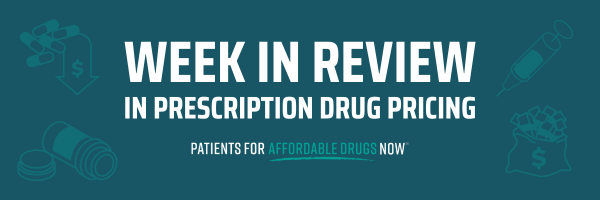
Welcome to the Week in Review.
1. Report Update: Hiding In Plain Sight
- This week, P4AD released a new report update — Hiding in Plain Sight — that examines the intertwined relationships between the drug industry and three groups purporting to represent the interest of patients: The Haystack Project, No Patient Left Behind, and the Community Oncology Alliance. This research is an update to P4AD’s 2021 report, The Hidden Hand, which detailed the financial ties that drug corporations have to patient groups and their resulting influence in blocking legislation to lower drug prices. The key findings of the update to the report clearly connect all three groups back to drug corporations and trade associations. “Pharma pumps money into physician groups, researchers, academic medical centers, advocacy groups, and the exact funding is almost never disclosed,” said P4AD founder David Mitchell. Both Hiding in Plain Sight and The Hidden Hand are intended as a guide for policymakers, elected officials, and the media to understand how many patient advocacy groups are affiliated with the drug industry. Of note, P4AD accepts no funding from any organization that profits from the development or distribution of prescription drugs. — (P4AD)
2. Momentum For Drug Price Reforms In Senate
- There continues to be a growing appetite to advance bipartisan drug price reform in the Senate as members are out on recess. Senate Finance Committee Ranking Member Mike Crapo spread the word to constituents about bipartisan legislation advanced out of the Finance committee that addresses the lack of transparency within the pharmacy benefit manager (PBM) industry. P4AD’s Sarah Kaminer Bourland spoke to Axios about transparency requirements in the PBM bills: “Sunshine is the best medicine, and we think transparency is worth it, because then we can have at least clear incentives and work to undo some of the perverse ones.” Advocates are also pushing the Senate to pass reforms to our patent and regulatory systems that address Big Pharma’s exploitation and profit scheming. A new study in JAMA found that between 2000-2015, there was a 200 percent increase in patents filed by companies that made minor tweaks to their drugs. This form of patent gaming delays generic drugs from coming to market and leaves patients with no choice but to pay more for costly brand-name drugs. Merck is close to becoming the lead offender of patent abuse for its cancer drug Keytruda. Merck increased Keytruda’s price this year by an extra $200 per dose, even though “nothing meaningful about the drug has changed,” Axios reported. This is unacceptable, shady behavior for an industry that claims its drug prices are tied to innovation. Thankfully, Majority Leader Schumer plans to bring to the floor a health care package that could combine reforms addressing PBMs, promoting competition, and increasing transparency once members return to session in September. It’s time to make sure our drug price system puts patients first! — (KMVT, Axios, JAMA, Axios, Punch Bowl News)
3. The Inflation Reduction Act Brings On The Savings!
- Passage of the historic Inflation Reduction Act marks its first anniversary next week and lawmakers and advocates are celebrating how the drug price reforms help patients. A new report from AARP underscores the significance of the inflationary rebates to limit drug price increases to the rate of inflation. The report found that list prices for the top 25 drugs with the highest Medicare spending in 2021 increased by an average of 226 percent since they first came to market. Many of these high-priced drugs listed in the report are anticipated to be considered for the widely supported Medicare negotiation program, which will not only reduce drug costs for patients, “but it will save taxpayers hundreds of billions of dollars,” Senator Tammy Baldwin explained. The historic drug price law has already delivered significant relief to patients in just one year. Susan from Michigan delayed getting her shingles vaccine “because, as a senior on a fixed income, the $400 copay was cost prohibitive” — but she’s now relieved that the new law eliminates cost sharing for vaccines. Senator Joe Manchin celebrated the huge cost savings for West Virginians from the $35 monthly insulin copay cap and president of Maryland’s Health Care For All, Vinny DeMarco cited the cap as the “number one cost-saver in the state,” providing relief to about 50,000 Marylanders on Medicare. Finally, patients are getting long awaited relief from high drug prices — we look forward to the soon-to-be implemented provisions that will bring even more savings. — (AARP, AARP, Post-Standard, WXOW, Center For American Progress, The Hill, WMDT, The Baltimore Sun)
BONUS: In this edition of Big Pharma’s shady behavior: Drug companies shift profits overseas to low-tax jurisdictions in order to line their coffers with billions of dollars. People in the United States pay some of the highest drug prices in the world and receive “none of the benefits” from the U.S. pharmaceutical industry, reportedBusiness Insider.
Have a great weekend!
